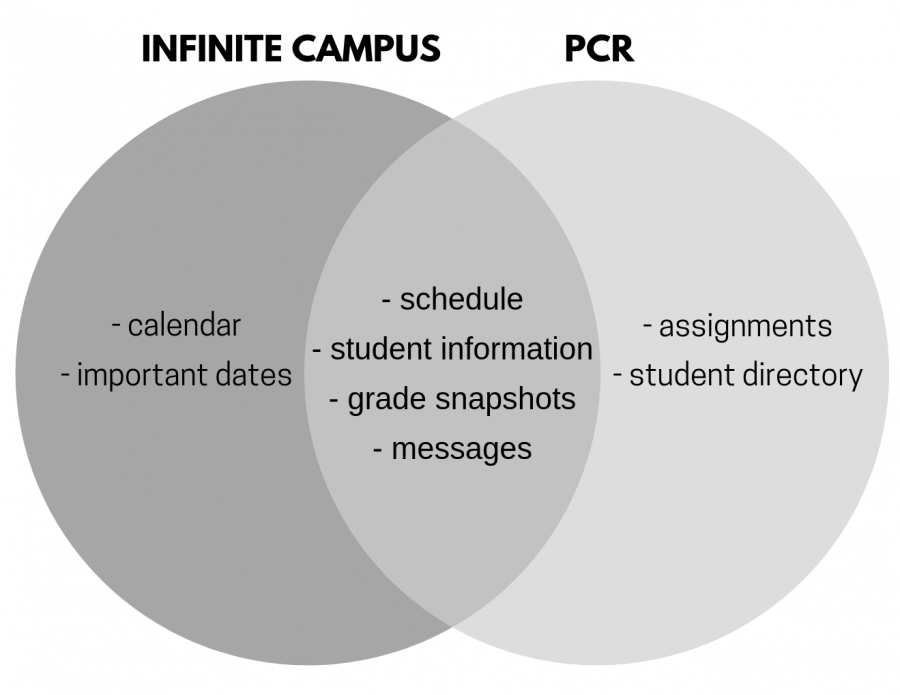Behind the scenes: New student information system
With the new system, Infinite Campus and Schoology will both work together to replace PCR. Assignments will be accessed through Schoology, which is a major change from previous years.
August 23, 2019
After a two-year process, Harker has switched from PCR to a new student information system called Infinite Campus for the upcoming academic school year. Infinite Campus is a database that will provide student information such as schedules and grades as needed for all the other programs, including those used by faculty, admissions, advancement, technology, finance, human resources, transportation, BEST, administration and students. Infinite Campus will also be used in conjunction with Schoology.
All of the systems will work together: for example, grades and data will be entered in Schoology and pushed into Infinite Campus in order for the transcripts to be created, while information about which students are in which class with which teacher will get pushed from Infinite Campus into Schoology. Grades will be able to be seen by students in Schoology.
The project was headed by Liz Brumbaugh, the Director of Learning, Innovation and Design, and its goal was to take a look at the current student information system and see if it was suitable for the needs of all of the users, including faculty, students, and parents. If it was found to be unsuitable, then the project would focus on finding another system.
Since the goal of the project entailed replacing PCR if it was not suitable, PCR was considered in the list of possible systems. The first step of this process was to evaluate the current student information system. To do this, small focus groups of different internal users, including teachers and other faculty, were created.
The meetings in the focus groups had two main goals. The first goal was to establish a common language. The previous student information system had been referred to by different names such as PCR, portal, teacher connect, and campus portal. Having everyone call it a student information system (SIS) helped to establish a common language.
The second goal was to establish a common understanding. In order to do this, a student information system had to be defined. A traditional student information system is a database designed to store student and household information, as well as grades and attendance. It is ideally compatible with other programs and does not have glitches.
The next step was to compile a list of what the internal users wanted the new student information system to do. Although the internal users had a list of suggestions for the system, it was not expected of the system to do everything. While a lot of educational technology tries to find a one-size-fits-all solution, it is not a good long-term model, as it tries to fit in many different functions.
“What we’re looking for, what is more sustainable, is a program that is flexible to work with other programs,” said Brumbaugh.
During the 2017-18 school year, volunteers came together and formed an SIS Success Team that created a synthesized list of priorities, proposed and evaluated potential vendors and cross-checked the potential vendors against the priorities. Some of these priorities included the security of the data, the efficiency of the program and the ease of navigation for the user. The integration capabilities or compatibility with other programs was also considered.
Another goal was to make sure the program was well-used enough by schools across the nation.
In the spring of 2018, the school invited the top three vendors to provide demonstrations. The demonstration consisted of all types internal users, including faculty, faculty parents, admissions, athletics, administration, schedulers, attendance clerks and the IT team. Unlike how transportation software mostly affects only the people in transportation, Infinite Campus touches nearly every single employee across campus, since it underpins and provides information to all of the other programs.
Last summer, the decision was finally made to use Infinite Campus. Infinite Campus was chosen because of its compatibility, experience, and sandbox feature, as well as meeting the other aforementioned priorities. In terms of compatibility, it uses an industry standard called OneRoster IMS Global Standard, which is a standard specification for sharing data between systems securely. This standard makes Infinite Campus more likely to work with other programs.
Infinite Campus is a database that stores and maintains student and household information, grades, attendance and schedules, in addition to providing grade reports. It is the base piece of data that provides the basis for the other programs that are used. Since Schoology is designed to be an online classroom, teachers will use Schoology for assignments and grades, and the information will be transferred to Infinite Campus.
“Infinite Campus definitely motivates students to be more independent. For PCR, it kind of lays it out for you, but for Infinite Campus, you kind of have to manage your things by yourself,” said Michael Wang, a sophomore at Gunn High School who attended Harker in middle school. Gunn High School also utilizes both Infinite Campus and Schoology.
In early January 2019, a team from Infinite Campus visited for a week and held a series of deep-dive meetings. The implementation team consisting of five members from Infinite Campus and three to seven people from Harker also held weekly status meetings. The people from Harker in the team fluctuated depending on the content of that week’s call.
This spring, they began to run data migrations of current information, but they could not migrate all of the data immediately because school was still in session: admissions were not finished, and students were still earning grades. Data migrations were run with the current data in late March and late April. The final migration occurred after July 1 and was completed on July 17.
During the week of July 22, a trainer from Infinite Campus came to Harker and trained members of admissions, scheduling, attendance, information technology, professional development and administration.
Although there was a lot that was put into the decision and the new system was thoroughly evaluated and judged to be more beneficial, it will be an adjustment for everyone. Since a majority of the information will now be accessed from Schoology, there will not be additional instructional sessions for students on how to use Infinite Campus.
“Even though we’ve all had our frustrations with PCR, it’s been convenient to have all our assignments in one place,” said Katie Li (11). “It’s going to be hard to get used to a new platform since a lot of us have been using [PCR] for years.”


















![“[Building nerf blasters] became this outlet of creativity for me that hasn't been matched by anything else. The process [of] making a build complete to your desire is such a painstakingly difficult process, but I've had to learn from [the skills needed from] soldering to proper painting. There's so many different options for everything, if you think about it, it exists. The best part is [that] if it doesn't exist, you can build it yourself," Ishaan Parate said.](https://harkeraquila.com/wp-content/uploads/2022/08/DSC_8149-900x604.jpg)




![“When I came into high school, I was ready to be a follower. But DECA was a game changer for me. It helped me overcome my fear of public speaking, and it's played such a major role in who I've become today. To be able to successfully lead a chapter of 150 students, an officer team and be one of the upperclassmen I once really admired is something I'm [really] proud of,” Anvitha Tummala ('21) said.](https://harkeraquila.com/wp-content/uploads/2021/07/Screen-Shot-2021-07-25-at-9.50.05-AM-900x594.png)







![“I think getting up in the morning and having a sense of purpose [is exciting]. I think without a certain amount of drive, life is kind of obsolete and mundane, and I think having that every single day is what makes each day unique and kind of makes life exciting,” Neymika Jain (12) said.](https://harkeraquila.com/wp-content/uploads/2017/06/Screen-Shot-2017-06-03-at-4.54.16-PM.png)








![“My slogan is ‘slow feet, don’t eat, and I’m hungry.’ You need to run fast to get where you are–you aren't going to get those championships if you aren't fast,” Angel Cervantes (12) said. “I want to do well in school on my tests and in track and win championships for my team. I live by that, [and] I can do that anywhere: in the classroom or on the field.”](https://harkeraquila.com/wp-content/uploads/2018/06/DSC5146-900x601.jpg)
![“[Volleyball has] taught me how to fall correctly, and another thing it taught is that you don’t have to be the best at something to be good at it. If you just hit the ball in a smart way, then it still scores points and you’re good at it. You could be a background player and still make a much bigger impact on the team than you would think,” Anya Gert (’20) said.](https://harkeraquila.com/wp-content/uploads/2020/06/AnnaGert_JinTuan_HoHPhotoEdited-600x900.jpeg)

![“I'm not nearly there yet, but [my confidence has] definitely been getting better since I was pretty shy and timid coming into Harker my freshman year. I know that there's a lot of people that are really confident in what they do, and I really admire them. Everyone's so driven and that has really pushed me to kind of try to find my own place in high school and be more confident,” Alyssa Huang (’20) said.](https://harkeraquila.com/wp-content/uploads/2020/06/AlyssaHuang_EmilyChen_HoHPhoto-900x749.jpeg)











